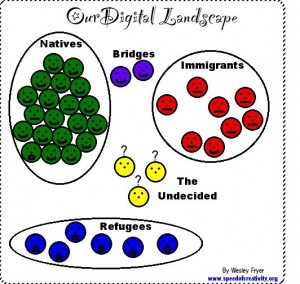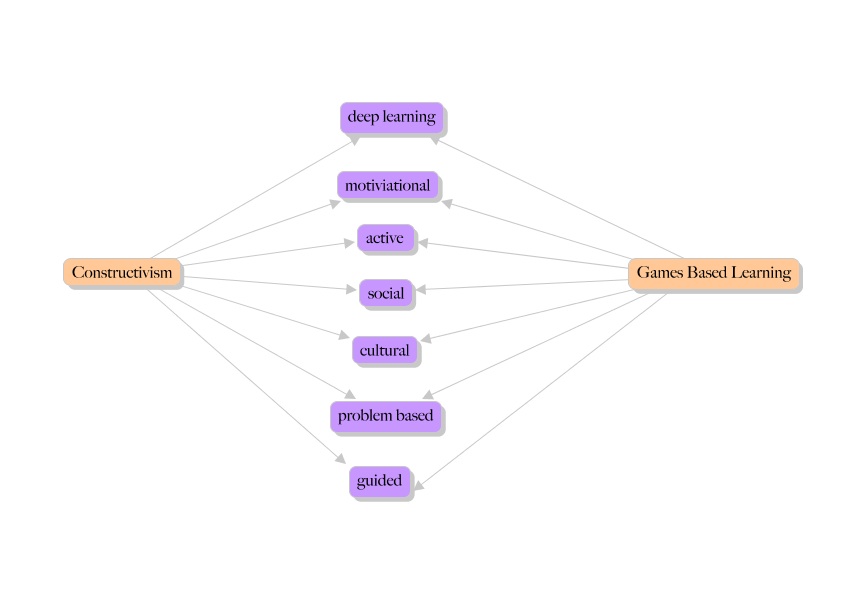The thought leaders in gaming theory provide some compelling evidence to support the trend of digital learning games for adult education.
The landscapes of our communities and business environments are changing as more and more digital natives merge into organizational and institutional structures once controlled solely by digital immigrants. The terms digital natives and immigrants were introduced by Mark Prensky, in his seminal essay Digital Natives, Digital Immigrants. (2001). Prensky has published strategies for teaching digital natives and he has a lengthy list of successful learning games companies which he has founded. The concept of digital natives has been picked up by others, such as John Beck, author of Got Game, and director of the Information + Innovation Policy Research Centre who describes business management strategies targeted to what Beck calls ‘the gamer generation’. Beck is also the visionary behind a for-profit non-technology based business strategy game WarGames. Clearly there is a trend towards serious games for adult learning, and consultants, authors, and software development companies are profiting from it.
To understand why, we can look to researchers like James Paul Gee, a leading game researcher and author, who has demonstrated through research that games build rather than diminish cognitive skills, pattern recognition, systems thinking, and patience. One of Gee’s (2005) key findings is that students prosper when the subject matter challenges them right at the edge of their abilities. If the challenge is too difficult it results in frustration. If the game is too easy it results in boredom. “Cognitive psychologists call this the ‘regime of competence’ principle.” Gee recognized this principle as central to video games. You can learn more about Gee’s research in this article in Discover Magazine.
Jane McGonigal, is another thought leader that is making significant progress in gaming research and development. McGonigal is the Director of Game Research and Development at the Institute for the Future and she takes the concept of ‘regime of competence’ a step further and introduces the theory of an ‘epic win’. She’s designed her concepts into social media games such as Evoke, a social network game, self titled as ‘a ten-week crash course in changing the world.’
McGonigal presented her ideas in this 2010 Ted Talk, Gaming can make a better world.
McGonigal also develops and prototypes other adult games for learning such as CryptoZoo which demonstrated how a game can elevate heart rate as much as run or workout. McGonigal is a good reflection of the reality of the gaming generation that is now joining the ranks of the business community landscape. With this changing landscape comes the need for new engagement strategies in the workplace.
To explore ideas for how gaming is being applied in the business environment we can look at the work of Karl Kapp, an author and thought leader in adult gaming strategies. Kapp has extensive business and interactive instructional experience. Kapp argues that gamers are problem solvers, confident in the workplace, resilient – learning well from trial and error, and that they are very social through technology. In his four part video series, Kapp presents research from Forester Research that illustrates that the younger you are the more involved you are in web 2.0 technologies. Kids, as digital natives, are producers and consumers of information at the same time and that the ‘sage on the stage’ form of learning no longer works because they have been encultured in web 2.0 technologies.
You can find more about Kapp’s theories in the following four part video series, Games and the Gamer Generation. Part 3 and part 4 are the most relevant from the perspective adult learning games.
Well-designed learning games have strong ties to Constructivist Learning theory, the core principles are illustrated below.
References
Fryer, Wesley. (2006). Our Digital Landscapes. [image]. Retrieved online Sept. 27, 2011 from
“http://www.flickr.com/photos/wfryer/275042551/”
Gee, James (no date). Good video games and good learning. [PDF document]. University of Wisconsin-Madison. Retrieved online from http://www.academiccolab.org/resources/documents/Good_Learning.pdf
Gee, James. (2005). Your Brain on Video Games. Discover Magazine. Retrieved online from http://discovermagazine.com/2005/jul/brain-on-video-games
Kapp, Karl. (2007). Games and the Gamer Generation. [YouTube video]. National Center for Telecomunications Technologies. Retrieved online from https://www.youtube.com/user/NatCtrTelecomTech#p/search/1/kfnbmTDn29M
McConigal, J. 2010. Gaming can make a better world. TED: Ideas worth Spreading. [ Conference Talk]. Retrieved online from http://www.ted.com/talks/jane_mcgonigal_gaming_can_make_a_better_world.html
Prensky, M. 2001. Digital Natives, Digital Immigrants. On the Horizon, MCB University Press, Vol. 9 No. 5. Retrieved online from http://www.marcprensky.com/writing/Prensky%20-%20Digital%20Natives,%20Digital%20Immigrants%20-%20Part1.pdf


